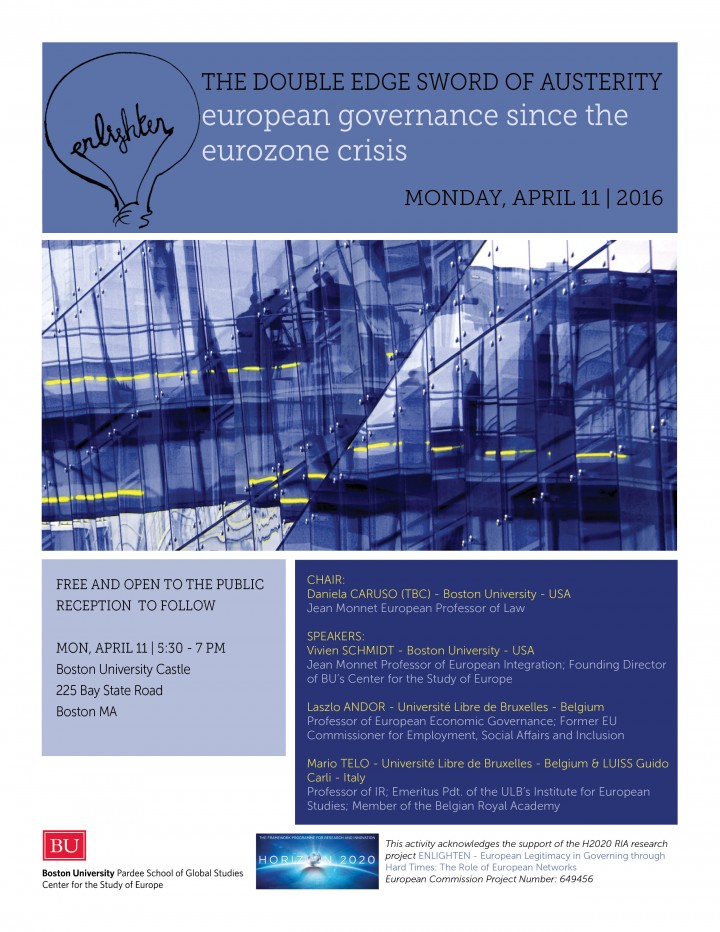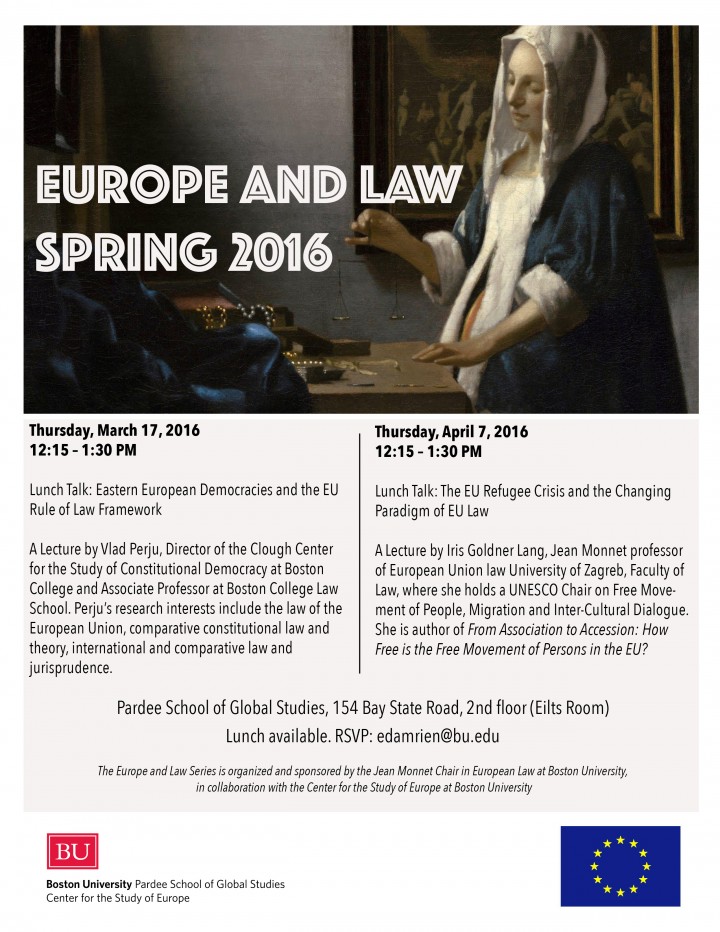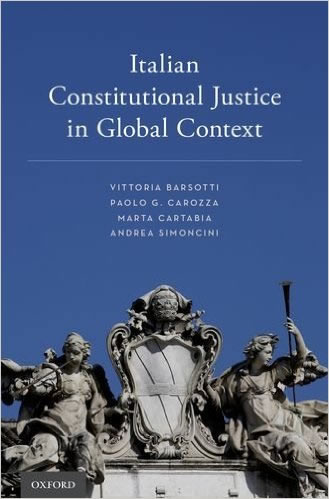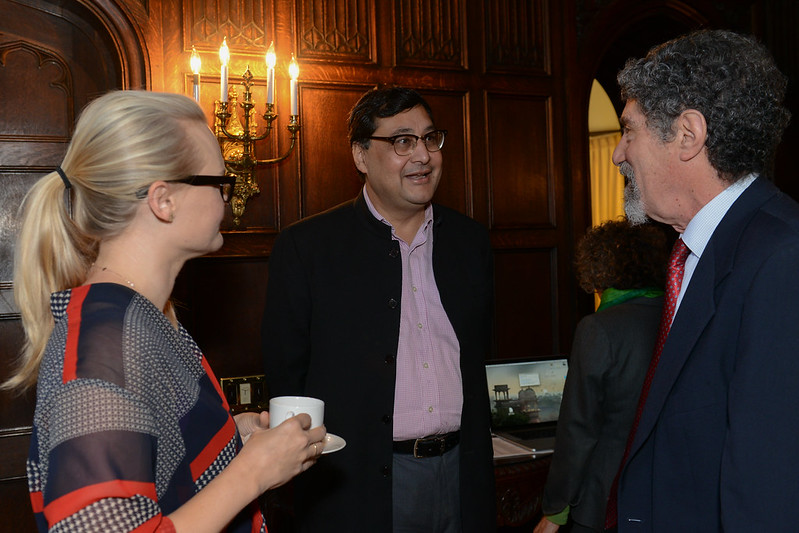On Monday, April 11th, we hosted a panel discussion on the topic of European governance during the Eurozone Crisis. The speakers included: Vivien SCHMIDT, Jean Monnet Professor of European Integration and Founding Director of BU’s Center for the Study of Europe; Laszlo ANDOR, Professor of European Economic Governance at the Institute for European Studies of the ULB and Former EU Commissioner for Employment, Social Affairs and Inclusion; Mario TELO, Professor of International Relations at the Université Libre de Bruxelles – ULB and at the LUISS Guido Carli di Roma, Emeritus President of the Institute for European Studies of the ULB and Member of the Belgian Royal Academy. The panel was moderated by Daniela Caruso, Jean Monnet Professor of European Law and Boston University Professor of Law.
The event began with an introduction of the panelists by Professor Caruso. Vivien Schmidt then gave her presentation, beginning with a theorization of the roles and of democratic legitimacy in the Eurozone Crisis, particularly in the context of Horizon 2020. She discussed how the Eurozone Crisis was not just the problem of economic of political issues, but instead the broader issue of legitimacy, explaining how “institution actors responded by governing by the rules, and ruling by the numbers.” Rather than responding to the crisis with deep integration policies such as mutualization of debt and Eurobonds, Schmidt explained how EU actors instead doubled down on the rules. She talked about how EU institutional actors began to reinterpret the rules with incremental changes, raising the question “how have EU institutional actors managed to bend or even break legally binding rules while retaining legitimacy through the Eurozone Crisis?” She broke down the necessary levels of building, coordinating, and communications regard the reinterpretations of legitimacy, and explained the different intensities in the crisis: the “fast burning” times of doubling down of rules and interest based decision making versus “slow burning” crisis when there is an ability to dig out and formulate new solutions.
Schmidt then turned toward the question of output and inputs within European studies literature regarding the effectiveness of EU institutional actor policies. She explained that output is the technological non-major actors with technical know-how and economic principles to reinforce legitimacy versus major political actors focusing on the ideas, interest, and values of the elites and the perception and normative principles of the citizens. Input was described as politics, in terms of citizen participation and governmental responses to the demands of the general public. Schmidt explained how input could be distinguished at the national and EU levels, as national input is focused on the government working for the people (leader to participation) while the EU level, various institutional actors link different sources of legitimacy. Schmidt then described the tradeoff between input and output, defining the “black box of governance” as the accountability, transparency, inclusion, accessibility, and ethicacy that institutional actors claim. Schmidt said “I call all of this ‘throughput’. Unfortunately throughput doesn’t work,” adding, “governing by the rules, ruling by the numbers did not work. Throughput did not necessarily provide good output,” and she identified unemployment, deflation, and low growth as the resulting failures of the Eurozone Crisis in this failed tradeoff assumption.
Schmidt then claimed that this situation is what caused the “reinterpretation of rules by self”, as the EU institutional actors only later realized that they had inadvertently trapped themselves in the rules they originally created, so they then go back looking for flexibility under the premise of “they say one thing, do another”. She gave the example of how the European Central Bank was completely redone but claimed its actions were “within its mandate” with the goal that “credibility [would lead] to stability” and continually claiming “we are following the rules” while the mandate was radically reinterpreted. She compared the actions of the European Central Bank to the European Commission, who continually denied changes and derogations to the rules, asking “whether the European Central Bank is the hero or ogre of the crisis?” and whether the Commission members are “the Ayatollahs or austerity?” or “ministers of moderation?”. Schmidt concluded by describing how democratization faces problems of legitimacy, focused on input, muddling through, and resulting in insufficient output.
The next panelist to speak was Laszlo Andor, who spoke about American economists in the late 1990s, who critiqued the Maasricht Treaty and the concept of the Eurozone. Andor described how some Americans predicted a future economic crash and even began theorizing a potential solution to save European economies similar to the Marshall Plan of the late 1940s. He then addressed the Eurozone Crisis, citing the importance of American aid – both direct and indirect – which has been channeled to Europe through institutions such as the IMF in recent years. Andor discussed how the concept of austerity was the center of conversations relating to the Eurozone Crisis, but how the tones of these discussions were dominated by critiques and questions surrounding the definition of austerity. Andor explained how austerity has multiple definitions and is overall both a outcome (of fiscal, monetary, and other policies) and an input (to the extent that in 2011-12 political parties were advocating responsibility and prioritizing stability through deficit limitations) within the institutional structure.
Continuing, Andor defined austerity as the situation when “governments are cutting expenditures, especially wages, but have sacrifices of real economics.” He claimed that, in times of adversity or economic downturn, institutions implement fiscal consolidation instead of economic expansionary policy. He critiqued this definition for being too narrow, as it exempts monetary policy. Andor explained that the problem facing Europe is not whether or not it can recover from the ‘philosophy of austerity, but instead faces the problem that the overall architecture of the Maastricht Treaty is better for consolidation rather than growth. He then delved into the question of whether Maastricht needs to be modified or whether the Maasrticht Treaty needs to work through its intellectual failings, claiming that austerity can work in a small open economy but, when applied across multiple unique economies simultaneously, austerity can be counteractive and drain economies. Andor concluded by stating, “the EU is just too polarized, just too vulnerable and, as a result, [is] potentially facing the next economic downturn without the monetary system being repaired or prepared for it.”
The final panelist to speak, Mario Telo, began by identifying the three major challenges facing the U.S. and EU. The first named was the post-Cold War multipolar power structure and the resulting complex global governance which faces new threats that negatively interplay and tremendously affect the Eurozone Crisis. The second problem of enduring global economic uncertainties, after almost a decade of crisis, has been demonstrated by the unsatisfactory growth in the U.S. and EU when compared to the growth rates of the BRICS nations. Finally, Telo identified the challenge of deepening social consequences and the resulting domestic troubles facing Western liberal democracy, specifically citing the rise of populism, “what I call ‘authoritarian temptation’ on both sides of the Atlantic.”
Telo explained how the U.S. has more resources to cope with such issues as a Federal State, versus the EU which is a collection of states. He continued by citing differences between the U.S. and EU in terms of available budgets, ability to attract international investors, and the varying political challenges. For example, Telo described how the U.S. democracy is facing extreme polarization but can cope with these issues by channeling populist sentiments between the state and national levels, while the EU faces multiple independent anti-democratic movements in several Member States. He continued by explaining how Europe, while living through 6 years of economic downturn, has faced multiple other other crises simultaneously: the question of policy (e.g. Brexit, secessionist movements), the refugee emergency, and instability on the Eastern and Southern border given the rise of Islamic terrorism.
Telo discussed his worries regarding the fragility of the Eurozone, specifically its ability to cope with new global clash due to growing international debt, calling for a renewed intensity and prudence in the evaluation of EU policy. He then described the importance of German leadership in leading quantitative easing, adding that there is now a divide in whether a shift back from ultra-liberal economic policy toward the more traditional Keynesian policy is necessary. Telo stated that the parallels being drawn between todays crisis and that of the 30s are “not appropriated,” continuing by explaining how Keynesian economics aided in the under consumption, overproduction problems of the interwar period, but how currently the Eurozone needs new innovative policies. He described that the unequal distribution of debt has brought into question the mix of European policy and public goods, in addition to the role of Germany.
Addressing the emerging future of the EU, Telo identified two major questions Europe must face: what economic policy going forward and how do we democratize the Eurozone? He explained the recent steps backs “after the three democratization waves” and how populist leaders have made their admiration of Vladimir Putin evident in their critiques of the European democratic structure. Telo warned that “manipulation of fears can go very far,” bringing attention to the question of future European democracy in the face of national, protectionist, and authoritarian right wing movements across Europe. He then called for a new proposal for democratization of the Eurozone and new reforms for economic governance focused on national budgetary policy and centralization by the European Parliament to improve both democratization and participating in decision making. He describes the option of creating an annual assembly of national parliaments when the Member States would come together to address major issues focusing on coordination and cooperation, in addition to the establishment of a distinct Eurozone budget and the formation of a European Parliament committee dedicated to the Eurozone, based on his ideal of an EU centered upon a “concentric circle” of institutional architecture.
Prof. Caruso, who moderated the session, opened up for questions from the audience, including further explanation of the European Central Banks violations of its mandate and its potential contribution to the rise of populist movements, the question of who decides the extremity of flexibility and reinterpretations of rules, and the shifting dialogue of the European Commission from “stability is a prerequisite for jobs and growth” toward an emphasis on “jobs and growth are a prerequisite for stability”? While each panelist was given the time to address the questions posed by the audience, Vivien Schmidt asked, “what if we change our idea of EU and Eurozone governance to be less hierarchical, and instead more coordinated, more decent?” continuing by describing the possible model of the European Central Bank setting targets and Member States being given independent goals in the search for a solution to the Eurozone Crisis. Telo ended the discussion with a call to action for Europeans to address the challenges originally faced by Montesquieu, concluding: “without representation of the people and international power, the European project is condemned.”
This activity acknowledges the support of the H2020 RIA research project ENLIGHTEN – European Legitimacy in Governing through Hard Times: the role of European Networks European Commission Project Number: 649456










